Resources
In this section we will share all of our tools openly, like workshop concepts, exercises, slides and presentations, background literature or video footage.
To start out, we have created a page with helpful articles both on “the problem” and “the solutions”, plus a few of our presentations, and some recommendations for films and videos you can watch or show to get your audience informed and engaged about Planet Action and about the role businesses can play in it.
Menu
Videos
This 35 mins. documentary “The Decade of Action” is a remarkable summary on sustainability and why businesses need to go all-in if we want to achieve our climate goals and keep our world safe for our children, grandchildren, and great-grandchildren. This is the decade. We are the generation.
This 5 video “Project Drawdown Roadmap” charts a path for governments, businesses, investors, philanthropists, and others how to take climate action in the most effective way.
This heartwarming film, produced by the WWF and inspired by Netflix’s Our Planet series, carries a clear, positive and emotional message underlined with high profile interviews and wonderful nature pictures, how businesses can play their part in restoring nature and building a stable future for our planet.
In this 32 mins. video, the thinktank RethinkX takes viewers on a whirlwind tour of the rise and fall of civilizations, displaying how fundamental technological breakthroughs have brought us to where we are today, and which choices we are now confronted with. Today, in the 2020s and 2030s, we can see further exponential technological changes which will lead to costs falling by 10x or more in the key sectors of information, energy, food, transportation, and materials, while production processes using 90% fewer natural resources with 10x-100x less waste. But this is just one future outcome if we manage to use and develop the possibilities at our fingertips in strategy and collaboration.
“Earthrise” by Youth Poet Laureate Amanda Gorman. “It is a hope that implores us at an uncompromising core to keep rising up for an Earth more than worth fighting for.” A 4 mins. poem beautifully calling out for dedicated action NOW.
Project Drawdown has put together this great series of six educational videos of between 10 and 12 minutes each, making their framework of climate solutions available, understandable and practically applicable both to experts and novices in the field. A must watch for everyone who does not only want to understand the problem, but who aspires to take action in order to make the solutions become reality in time.
Recommended Viewing
Netflix’s ‘David Attenborough: A Life On Our Planet’ has been called “the most important documentary of 2020” by the Forbes magazine. Moving through the decades with beautiful pictures, the film marks each stage of Attenborough’s career with the ever-declining state of the natural world, the percentage of remaining wildlife takes a dramatic plunge in the last thirty years, as the cumulative damage begins to snowball.
Thankfully, the documentary soon takes a more optimistic turn, as major environmental victories are highlighted, and the film begins to focus not on a scorched, apocalyptic future, but a world restored. The real purpose of the documentary, however, is to highlight the scale of the problem, warn of the potential consequences, and lastly, install a sense of hope.
The Sustainability Secret is a groundbreaking feature-length environmental documentary following intrepid filmmaker Kip Andersen as he uncovers the most destructive industry facing the planet today – and investigates why the world’s leading environmental organizations are too afraid to talk about it.
The solution is right under our feet.” This inspiring movie on Netflix has awakened millions of people around the world to the possibilities of regenerative agriculture – and now it’s time to act.
Presented by National Geographic, features Leonardo DiCaprio on a journey as a United Nations Messenger of Peace, traveling to five continents and the Arctic to witness climate change firsthand. He goes on expeditions with scientists uncovering the reality of climate change and meets with political leaders fighting against inaction. With unprecedented access to thought leaders around the world, DiCaprio searches for hope in a rising tide of catastrophic news.
2040 is an exciting and uplifting film depicting a world 20 years from now where climate change has been solved. Described as “an exercise in fact-based dreaming” the film travels around the world investigating numerous solutions that can contribute towards climate mitigation and imagining what a future would be like where they have been implemented at scale. The film displays only technologies and approaches that are either already available or have a realistic potential to greatly contribute to reversing climate change by the year 2040.
The world’s climate is changing. Instead of showing the worst that can happen, the documentary Tomorrow sets out to showcase alternative and creative ways of running agriculture, economics, energy and education. It offers constructive solutions to act on a local level to make a difference on a global level. So far, they say, “no other documentary has gone down such an optimistic road…”
Background Literature
The Problem

State of the Global Climate 2022
In its annual report on the "State of the Global Climate", the World Meteorological Organisation (WMO) summarises the most relevant climate indicators, revealing the ways in which the climate is changing and provides a broad picture on a global scale.
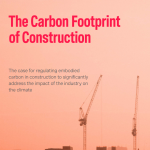
The Carbon Footprint of Construction - ACAN 2021
This report from February 2021 published by the Architects Climate Action Network displays that on average 75% of building total emissions from a typical 60-year lifetime stem from Embodied Carbon (extraction, supply and fabrication of raw material, transportation, assembly on site, refurbishment and repair, disposal and demolition at the end of a building’s life), compared to only 25% from Operations (heating, electricity and cooling).

Food systems are responsible for a third of global anthropogenic GHG emissions
“Based on a new global food emissions database (EDGAR-FOOD), complemented with land use/land-use change emissions from the FAOSTAT emissions database, this article from March 2021 shows that in 2015, food-system emissions amounted to 18 Gt CO2 equivalent per year globally, representing 34% of total GHG emissions. The largest contribution came from agriculture and land use/land-use change activities (71%), with the remaining were from supply chain activities: retail, transport, consumption, fuel production, waste management, industrial processes and packaging.”
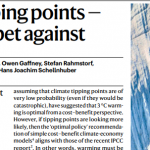
Climate tipping points — too risky to bet against (Nature, Nov. 2019)
The growing threat of abrupt and irreversible climate changes must compel political and economic action on emissions.
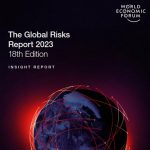
World Economic Forum - Global Risk Report 2023
The next decade will be characterized by environmental and societal crises, driven by underlying geopolitical and economic trends. “Cost- of-living crisis” is ranked as the most severe global risk over the next two years, peaking in the short term. “Biodiversity loss and ecosystem collapse” is viewed as one of the fastest deteriorating global risks over the next decade, and all six environmental risks feature in the top 10 risks over the next 10 years.
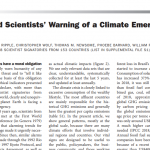
11,528 World Scientists’ Warning of a Climate Emergency (Nov. 2019)
Scientists have a moral obligation to clearly warn humanity of any catastrophic threat and to “tell it like it is.” On the basis of this obligation and the graphical indicators presented below, we declare, with more than 11,000 scientist signatories from around the world, clearly and unequivocally that planet Earth is facing a climate emergency.
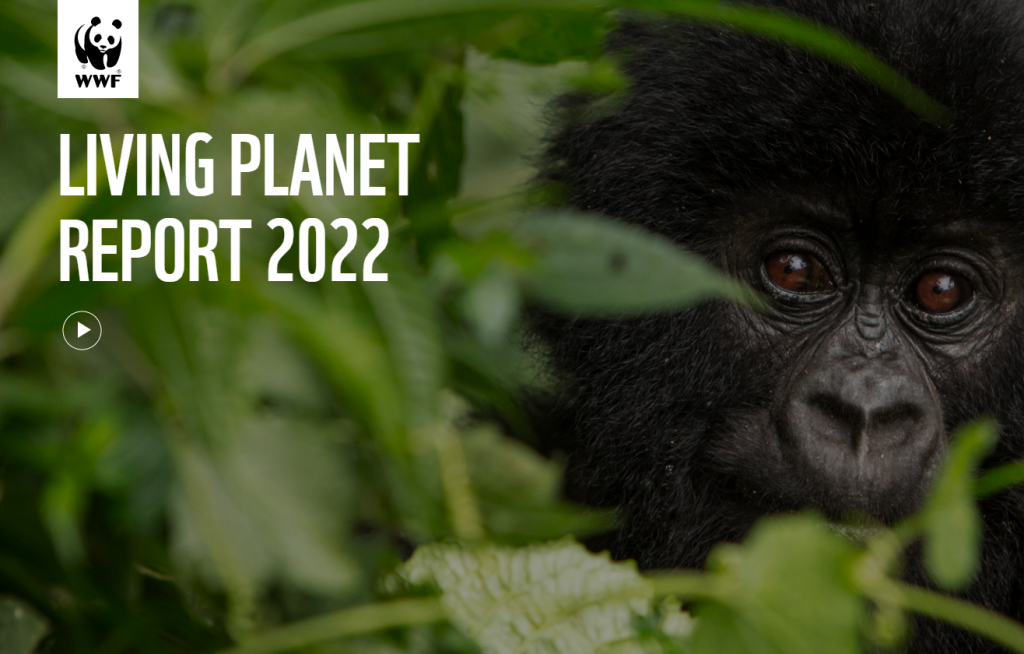
WWF - LIVING PLANET REPORT 2022
The climate crisis has arrived in our everyday lives. Another heat record year is behind us. Heat years lead to droughts and forest fires, heavy rain to flooding and flooding. More and more lives are to be mourned. And the damage runs into the billions. The species crisis can be experienced less closely, but nevertheless dramatically. The 14th edition of the Living Planet Report aims to show how species crisis and global warming are related, how the climate crisis and species extinction are rocking each other up and what solutions there are for this double crisis.

The Corporate Climate Responsibility Monitor 2023 by the New Climate Institute and Carbon Market Watch
The 2023 Corporate Climate Responsibility Monitor assesses the climate strategies of 24 major global companies, critically analysing the extent to which they demonstrate corporate climate leadership. All 24 have put themselves forward as climate leaders. we find the climate strategies of 15 of the 24 companies to be of low or very low integrity. Nonetheless, the analysis found that most of the companies’ strategies do not represent examples of good practice climate leadershipand that their climate change commitments do not add up to what their pledges might suggest.
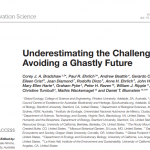
Underestimating the Challenges of Avoiding a Ghastly Future (Frontiers in Conservation Science, Jan. 2021)
We report three major and confronting environmental issues that have received little attention and require urgent action. First, we review the evidence that future environmental conditions will be far more dangerous than currently believed.

WEF - Nature Risk Rising: Why the Crisis Engulfing Nature Matters for Business and the Economy
Although the world’s 7.6 billion people represent only 0.01% of all living things by weight, humanity has already caused the loss of 83% of all wild mammals and half of all plants. The current rate of extinction is tens to hundreds of times higher than the average over the past 10 million years – and it is accelerating.

Scientists (again) Call for Action against Climate Change - July 2021
In 2019, Ripple and colleagues warned of untold suffering and declared a climate emergency together with more than 11,000 scientist signatories from 153 countries. In the present article (2021), they investigate recent changes in planetary vital signs since.
The Solution

“How to successfully start and run an "Employee Green Team" by planetgroups
With planetroups we facilitate and support employee driven initiatives for sustainability and climate action. Both from our own experience, and from research and interviews we conducted, we describe nine success factors in this article how employee driven Green Groups can make a substantial difference not only to corporate climate action, but also to making their companies more innovative, customer-centric and successful, and how they can make employees more engaged and purpose driven at their workplace.”
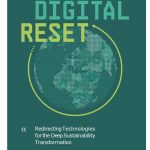
D4S - DIGITAL RESET - Redirecting Technologies for the Deep Sustainability Transformation
Governments around the world, as well as the European Union and United Nations organisations, are currently putting forward new initiatives to govern digital technologies and media infrastructures. However, most of these policy initiatives disregard the broader implications of digitalisation for environmental sustainability and social justice.This report argues that governing the megatrend of digitalisation must step up to today’s societal challenges. Runaway climate change, biodiversity loss, increasing social polarisation and an erosion of democracy require swift and decisive action.

Folke, C., Polasky, S., Rockström, J. et al. (2021): Our future in the Anthropocene biosphere.
“Broad coalitions among citizens, businesses, non-profits, and government agencies have the power to transform how we view and act on biosphere stewardship and build Earth resilience." says this great report published for the Nobel Prize Summit 2021 on "Our Planet. Our Future". Among many valuable findings both on the problem and the solutions, it emphasizes the importance of our planetgroups approach: "Transforming towards sustainable futures will require promoting new narratives that resonate, inspire, and provide hope," ... especially if "they offer possible course of action, something that reasonable people can aspire to," ... "fostering diverse forms of novelty and innovations at the micro-level, ... creating 'transformative spaces', allowing for experimentation with new mental models, ideas, and practices."
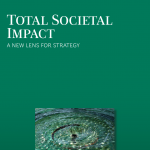
Total Societal Impact - A New Lense for Strategy : a Study by the Boston Consulting Group
Planet Action makes companies more successful! „Top performers in certain ESG (Environment, Social and Governance) topics had margins that were up to 12.4 percentage points higher, all else being equal, than those of the median performers in those topics.“ finds this study by the Boston Consulting Group.“Our analysis provides compelling evidence that companies can develop a robust strategy to make positive contributions to society with confidence that such an approach will increase enterprise value--not diminish it.“

UTOPIA 2048 by Lino Alexander Zeddies
Imagine you wake up in the year 2048, when the great social-ecological transformation will have succeeded, democracy is flourishing, peace and prosperity prevail, and the climate crisis has been successfully averted. What would this new world look like? This beautiful mix of fiction and documentary does not only show us what the world could be like if we dared to rebuild it that way. It also outlines how we got there, and what factors will have played a role to successfully master the transition.
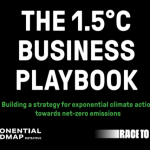
THE 1.5°C BUSINESS PLAYBOOK
This playbook by the Exponential Roadmap Initiative is developed for companies and organisations of all sizes that want to align with the 1.5°C and net-zero ambition. It contains solid guidelines for companies of all sizes to set targets, strategy and actions. It is made to prepare businesses for the fastest economic transition in history – and help them drive it.

Rethinking Climate Action - New perspectives and the opportunity for a fresh start
In this a bit longer piece planetgroups founder Tim Riedel describes his own journey to becoming a "Planet Activist", and how reviewing 8 perspectives on Climate Change has helped him to find a) inner peace, and b) new approaches to the topic. These perspectives are Science, Fear, Solutions, Apocalypse, Gaia, Ideology, the Business Case, and Communication.
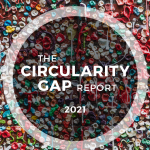
CIRCLE ECONOMY PRESENTS: THE CIRCULARITY GAP REPORT 2021
Enacted globally, a circular economy can close the Emissions Gap. This study shows that combining the twin agendas of circular economy and climate mitigation gets us on a path to a well below 2-degree world by 2032. The current pledges bring us over 15% of the way; the circular economy delivers the other 85%. Our current economy is only 8.6% circular, leaving a massive Circularity Gap. The good news is that we only need to close the Gap by a further 8.4%—or roughly double the current global figure of 8.6%—to get there.
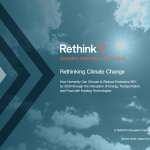
Rethinking Climate Change: How Humanity Can Choose to Reduce Emissions 90% by 2035 through the Disruption of Energy, Transportation, and Food with Existing Technologies.
In this report by the thinktank RethinkX, the authors show that with the right societal choices disruptions in the three areas Energy, Transportation and Food alone can eliminate the overwhelming majority of greenhouse gas (GHG) emissions worldwide within 15 years, and that market forces can be leveraged to do the bulk of the mitigation work because the technologies required are either already commercially available and competitive today, or can be deployed to market before 2025.

McKinsey and Company - Net-Zero Europe - Decarbonization pathways and socioeconomic implications
Europe can reach net-zero emissions at net-zero cost. Reducing GHG emissions would raise the cost of doing business in some sectors; savings in others would make up the difference. If these costs and savings were passed along to consumers, the average cost of living would decline slightly for low- and middle-income households. The transition would yield a net gain of 5 million jobs. Reaching net-zero emissions would create 11 million jobs and eliminate 6 million jobs through 2050. Up to 18 million people could need training and transition support. Sectors would need to reduce emissions in parallel and reach net-zero in sequence. The power sector would reach net-zero emissions first, in the mid-2040s, because most of the necessary technology is available now. Transport would approach its targetin 2045, followed by buildings in the late 2040s, industry in 2050, and then agriculture. More than half the emissions reductions could be achieved with mature and early-adoption technologies.
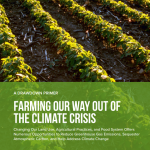
FARMING OUR WAY OUT OF THE CLIMATE CRISIS
When we think of climate change and greenhouse gas emissions, we usually envision power plants, factories, cars, and smokestacks — not farms and ranches.

XaaS Report - Everything as a service
To reverse the climate and biodiversity crises and build a climate neutral economy by 2050, we must accelerate the decoupling of our economic growth from emissions and resource use. A simple replacement of fossil-based with bio-based will not be enough. We need innovative circular business models that are increasingly service-oriented and drastically reduce our dependency on primary resource extraction. The Everything-as-a-Service report provides powerful and much-needed evidence on how such models work, and offers clear guidance to have them succeed on the ground.“
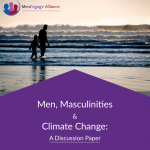
Men, Masculinities & Climate Change: A Discussion Paper
“Men, Masculinities and Climate Change: A Discussion Paper” aims to establish a rationale for understanding boys’ and men’s multiple roles in climate change by conducting an analysis of masculinities (characteristics associated with what it means to be a man) in patriarchal systems that play a contributing role in perpetuating climate change and by presenting key areas for further exploration.

Welcome to the Great Unraveling - Navigating the Polycrisis of Environmental and Social Breakdown
The central claim of this deep and systemic analysis is that the "polycrisis" is evidence that humanity is entering what some have called the Great Unraveling — a time of consequences in which individual impacts are compounding to threaten the very environmental and social systems that support modern human civilization. The Great Unraveling challenges us to grapple with the prospect of a far more difficult future, one of mutually exacerbating crises—some acute, others chronic—interacting across environmental and social systems in highly complex ways. This is what we can do, individually, in our communities, and as society. This is what we must face and coem to terms with.
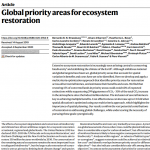
Global priority areas for ecosystem restoration
The effects of ecosystem degradation and conversion on biodiversity and climate have driven ambitious targets for ecosystem restoration at national, regional and global levels.

Winning the Race to Net Zero: The CEO Guide to Climate Advantage
The race to net zero will forever change the way in which many companies do business. The immediacy, pace and extent of change are still widely underestimated, but early movers can seize significant advantages. This report shows how.

How can companies — engaging their employees — use their full resources, scale and influence a broader community, to drive climate transformation?
This guide by the renowned source of climate solutions „Project Drawdown“ will help you understand how you can work with your colleagues to go further on saving our planet in your company – and which steps to take.
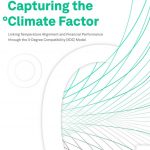
Capturing the Climate Factor - Linking Temperature Alignment and Financial Performance through the X-Degree Compatibility (XDC) Model
This report investigates the emergence of a Climate Factor within the European stock market, its correlation to returns, and whether it can be leveraged to capture market outperformance. On average, this study shows, the most climate aligned companies outperform their least climate aligned competitors by 6.5 times and a far less volatile stock development.
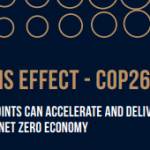
The Paris Effect - How Tipping Points Can Accelerate and Deliver a Prosperous Net Zero Economy
In the years since the Paris Agreement, progress on low-carbon solutions and markets has been much faster than most of us realize. In 2015, low-carbon technologies and business models could rarely compete with incumbent high-carbon solutions. Today in 2021, low-carbon solutions are competitive in sectors representing around 25% of emissions. By 2030, these solutions will have reached mass-market status in sectors representing 90% of global emissions. A stealth revolution is today propelling us towards a zero-carbon, digital future – if we play it right.
Presentations

Planetgroups Presentation
Our presentation about planetgroups; our mission, our benefits, and how you can get involved or start a planetgroup.


“Climate Leadership for Employees” – 150+ ways to drive sustainability in your company
How can I make a difference for the planet at my workplace? This presentation shows you – job family by job family – what you can do in your company. It’s a lot. Companies are run by employees. So is climate action!
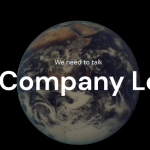

How can we convince our management to take meaningful Planet Action?
This concise presentation, put together by planetgroups.net in cooperation with the “Leaders for Climate Action” (lfca.earth) business community as part of the “Time for Climate Action” – Campaign in April 2021, will help to make the case. “This is the Decade of Action. Customers, employees and investors will cherish the companies who help us save this planet. And they will shun those who don’t. Which side will you be on?”
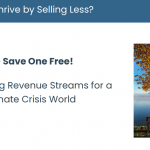

How to Thrive by Selling Less?
Modern Capitalism is built on the idea of selling as much as possible. In a post – Climate Crisis World, we will have to encourage our customers to consume less. How can we still be profitable in such a world? In this presentation you will find 8 business cases built around regeneration, qualitative growth and quantitative degrowth.
